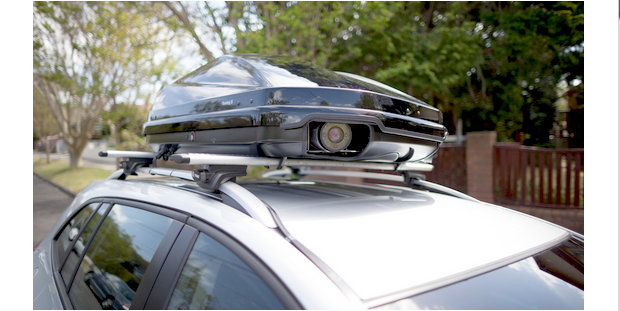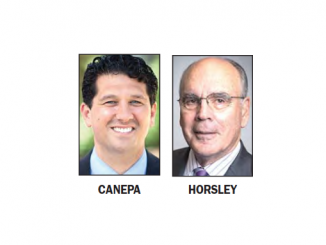
BY KYLE MARTIN
Daily Post Staff Writer
Palo Alto City Council last night (Feb. 22) unanimously approved spending $140,000 for automated license plate readers to catch cars without parking permits on residential streets.
Residents were divided over the technology. Some were concerned that the data — which would show when a car was parked in a particular place at a particular time — could violate the privacy of residents. Others, however, said that the data on parking trends would be bottled up at city hall and not available to the public until city employees decide to present it to support whatever argument they’re making.
“If the city is the only group that can access the data, they will be able to cherry pick the data and slice it and dice it to support any ‘data driven’ recommendation they choose to make and citizens will have absolutely no ability to challenge them,” resident Carol Scott told council. “If you really need to track the movements of some selected set of Palo Alto residents and get such a surveillance database going, then there must be independent oversight by a commission composed of residents to oversee the city’s use and have equal access to the data and tools to do their own analysis.”
Scott wondered why the city wanted to focus on residential areas with this technology instead of the University and California avenue parking areas, where demand for parking was high before the Covid shutdown.
“Why are you surveilling residents and maximizing parking in residential areas when the need is elsewhere?” Scott asked. “Neighborhoods are not commercial parking lots that are to be managed for maximum use.”
A city employee said that “union issues” prevent the city from using automated license plate readers in the commercial areas. The commercial areas are patrolled by Community Services Officers who are represented by SEIU, Local 521, which has a history of fiercely protecting its jobs in the city government. The residential neighborhoods have been patrolled by CSOs who work for a private company, and the city has more flexibility about changing the deal with the contractor than it does with SEIU.
Duncan Solutions of Milwaukee, Wisc., which will sell the plate readers to the city, has on its website its slogan, “Improving your revenue — and your motorist experience.”
Resident Bill Ross asked the council why the contract didn’t contract with a Palo Alto company to do the project, and why the project doesn’t include a “more vigorous analysis of the privacy policies that are set forth here.”
Neilson Buchanan, a Palo Alto resident who successfully campaigned for parking permits in residential neighborhoods near downtown, called in to tell council the city’s Office of Transportation and City Manager Ed Shikada “missed the big picture” by requesting this technology along residential streets.
“The elephant in the room is, ‘How are you going to manage the parking assets in the commercial zones of University Avenue and California Avenue?’” Buchanan said. “That’s where this technology and staff palate should be directed.”
And another resident, Christian Pease, said “this is really a perfect time to take a pause” and deal with other issues in the city’s congested commercial areas instead of focusing this technology on residential streets.
“This seems backward, piecemeal and a recipe for missteps, errors, lost opportunities and disappointment,” Pease said.
But Palo Alto Mayor Tom DuBois chimed in on the discussion to quell residents’ concerns about privacy, saying “having worked at Google, this is a big issue.”
“I think people want to hear that we’re treating it seriously and securely,” DuBois said. “I think we need to treat that very seriously, and part of that is this surveillance ordinance that the city passed.”
DuBois was referring to the city’s Surveillance and Privacy Protection Ordinance from September 2018 should cover most of the public’s concerns with this technology, an ordinance which requires the city to publicly evaluate any surveillance technology policy before it is passed.
The city’s chief transportation official, Philip Kamhi, told the council last night that the database to store the collected license plate information already exists, so the city wouldn’t have to create a new one, and that the data would be deleted about 96 hours after a driver gets ticketed for their parking violation.
The city’s transportation manager, Nathan Baird, also told the council that “there’s frankly no reason for myself or anybody to need to look at that for any reason whatsoever. And we will have to report when we do access that look, if we ever do for some reason.”
And Councilman Eric Filseth said he likes that the license plate readers will be effective at catching unpermitted parked cars that stay in the same spot for more than two hours.
“As a person that lived in a neighborhood that’s been heavily impacted by parking intrusion before we had that, I think that’s really valuable with the caveat and the constraint that we’ve got to be responsible with how the data is used,” Filseth said. “That’s critical. And if that can be addressed, then yes, please bring it to my neighborhood.”
Councilman Greg Tanaka said he wanted the city to explore using this technology for all of the city’s parking enforcement, including finding cars parked for longer than 72 hours in the same spot, which is the limit for any vehicle parked on any city street.
In neighborhoods that are part of the residential parking permit program, a driver cannot park for longer than two hours without a permit between 8 a.m. and 6 p.m. on weekdays. If somebody wants to park longer than that, they can move their car every two hours or get a temporary permit that they can hang from their rear-view mirror.
Residents can also buy up to four permits for visitors. The first one is free and the rest cost $50.
The purchase of the plate readers wasn’t put out for bids. Instead, the council last night modified its existing 2019 contract with Duncan Solutions, which handles other parking data matters for the city. The existing contract paid Duncan $627,000 and the plate readers will add $140,000 to that expense. However, city employees say that they saved $40,000 by not enforcing parking rules during the pandemic, meaning the city’s costs will only increase by $100,000.
However, the spending comes at a time when the city says it doesn’t have the $831,555 to provide full-time service by fire station No. 2 at 2675 Hanover St., serving the College Terrace neighborhood. The station is only operated part-time, and when it’s closed, other fire stations have to fill in the gaps, a process called a “brown out.”




Thank you, Mr. Martin, for the excellent presentation of most of the issues on both sides. Much better coverage than I have seen in the PA Weekly.
There are two developments that you did not mention which were critically important to residents. First, thanks to Lydia Kuo, an amendment to modify the approved uses of the data collected was approved: parking occupancy/availability data will be used only to decrease — not increase — the number of all-day employee permits sold in residential areas. The residents feared that the data would be used to justify an increase in permits whenever businesses (typically in under-parked buildings with no or never enforced transportation demand management plans) decide they need more. This happened to Evergreen Park/Mayfield in 2018, so our paranoia is justified. Second, thanks to Greg Tanaka, it was made clear the that Office of Transportation and Traffic would not be auditing itself, but instead there would be an annual audit on how the data are being used by the City Auditor. These two clarifications were hugely important to residents. We are grateful to Council members Kuo and Tanaka.
Thank you for your reporting.